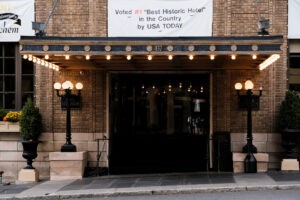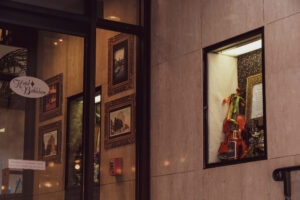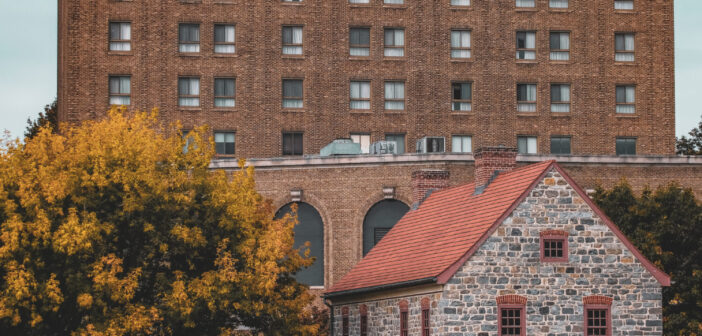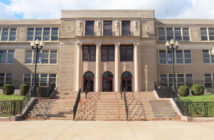Historic Hotel Bethlehem opened its doors 100 years ago. From being a prominent tourist attraction throughout the 1920s to temporarily shutting its doors in the late 1990s, this local hotel has a history.
This year, the hotel is celebrating its 100th anniversary by recognizing its long history and hosting a number of events. Hotel Bethlehem was named the No. 1 best historic hotel in the nation by USA Today for the second consecutive year.
The story of Hotel Bethlehem starts almost 200 years before its inception when a group of Moravian missionaries founded the First House in 1741. According to the hotel’s history book the building was primarily used as a shelter during the early developments of Bethlehem.
The First House then became a shelter called the Sun Inn for military leaders during the Revolutionary War. It was renamed once again in 1919 as the Golden Eagle Hotel, where soldiers found temporary housing during World War I.
Some famous guests of the time include Mark Twain, William Waldorf Astor and former president Ulysses S. Grant.
In 1921, Bethlehem Steel President Charles M. Schwab decided to replace the Golden Eagles Hotel with the 200 room Hotel Bethlehem.

Hotel Bethlehem was named the No. 1 best historic hotel in the nation according to USA Today for the second consecutive year. (Zijin Xia/B&W Staff)
Bruce Haines, ‘67, hotel managing partner, said much of the success of the hotel after World War I and the 1920s was attributed to Henry Ford’s automobile assembly line because they made cars more affordable to the average American.
“Bethlehem wanted a community hotel to serve as the center of social life for the residents as well as to attract tourists driving through town in their new automobiles,” Haines said. “Because of Bethlehem Steel’s new Rolled I beams, the Hotel Bethlehem could be built taller than all other earlier constructed buildings thereby drawing attention to the Hotel to get people to stop in Bethlehem vs other towns along the way to their destination.”
Haines said the hotel was the tallest building in Bethlehem at the time, attracting tourists to stay the night when passing through. He said it became the social center of Bethlehem.
However, it wasn’t long until Hotel Bethlehem took on another challenge: interstate highways.
Haines said the interstate highway system built in the 1950’s diverted traffic away from downtowns as motels were built at the interchanges. This development began the decline of downtown hotels like Hotel Bethlehem creating the ultimate demise of 90% of community hotels built in the 1920’s.
During the 1960s, Bethlehem Steel bought the hotel. The company’s intention was to restore the hotel back to its original state by initiating a complete overhaul renovation.
The newly restored grandeur and importance of the hotel did not last long, as Bethlehem Steel began to suffer from an increase in cheaper foreign steel imports. The company decided to shed itself of nonessential investments that were not a part of their core business, thus selling the hotel to a local businessman named Robert Decker.
The hotel struggled afterward and later went bankrupt in January 1998.
Kelly Ronalds, director of sales and operations for the hotel, said the 1990s were some of the bleakest times for Bethlehem. In order to salvage the hotel, she said a group of 13 Lehigh and Lafayette alumni, including Haines, came together to take the hotel out of bankruptcy.
In 1998, Haines, who had planned to stay at the hotel over the following weekend, said he received a phone call from the Decker family saying they were going to permanently shut down the hotel. Haines said this phone call changed his life.

Hotel Bethlehem intially opened as the First House in 1741 and then became a shelter called the Sun Inn for military leaders during the Revolutionary War. (Zijin Xia/B&W Staff)
Haines said the Decker family had plans to convert the top three floors of the hotel into senior housing and the bottom three floors to be girls dorms for Moravian college.
“No one stepped forward and Hotel Bethlehem was about to go down,” Haines said. “It seemed like a huge piece of the community was going. When I went to school here in the 60s, Hotel Bethlehem was effectively Lehigh’s hotel. My parents would stay there, take us to brunch or something. It was a special place to me.”
Haines said he and former Lehigh classmate Bill Trotter, ’67, were able to find 13 people to pool their money together in order to buy the hotel out of bankruptcy under Christmas City Hotel, LLC in 1999.
With restorations underway, Haines said the hotel was able to reopen within a year.
“It makes us happy that the community can find such pleasure in coming to visit and see a huge piece of Bethlehem history,” Haines said.
Ronalds said COVID-19 has been the hardest thing the hotel has had to endure in recent history. She said over 200 employees were laid off, leaving only 21 to do the jobs of many.
During the height of the pandemic, staff were expected to step outside their usual roles. Ronalds said she cleaned rooms and served food to help the hotel manage the understaffing.
“When people were closing down their businesses, we were reinvesting,” she said. “It truly gave us one of the best senses of accomplishment during one of the hardest times. It really showed what a team we are.”
Ronalds said the hotel’s restaurant saw over 400 to-go orders on Easter in April 2020. She said this showed how the Bethlehem community was able to support businesses despite the difficult time.
Without a single guest staying in the hotel that Easter, Ronalds said the restaurant was still able to feed hundreds of residents and sustain hotel functions with their limited staff.
This year, the hotel hosted over 500 guests for an era-themed party in celebration of its 100th anniversary. Dan Withrow, director of food and beverages, led the event.
Withrow said each event space in the hotel portrayed a different time period, including the 1920s, 1930s and 1970s.
“We were really interested in having different eras portrayed in different rooms and so we researched a lot into different music styles and food to go into each room,” Withrow said. “I’ve done a lot of events in my life, and this was probably the most fun because of how involved everyone was. It was a perfect, wonderful event.”
Ronalds said the hotel is an anchor in a historic landmark.
“We are walking on the footsteps of history,” Ronalds said. “I’m walking down the steps that Thomas Edison may have walked, that hundreds of brides have been on, staying in the room that the Dalai Lama stayed in. If we continue talking about it, the hotel will continue to have a bright future.”






Comment policy
Comments posted to The Brown and White website are reviewed by a moderator before being approved. Incendiary speech or harassing language, including comments targeted at individuals, may be deemed unacceptable and not published. Spam and other soliciting will also be declined.
The Brown and White also reserves the right to not publish entirely anonymous comments.
1 Comment
great piece Oliva wonderful historic knowledge…I stay there most of time when back at Lehigh, it truly is a Lehigh hotel and not many universities have something like this